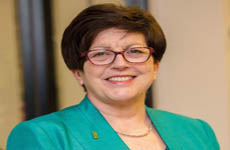By Pauline Green
Dame Pauline Green was one of six member-nominated directors put forward for election by the Group’s members council, for three seats on the Group board. The transitional search committee decided to put forward only three of the six for ballot at the Group’s annual meeting in May. Dame Pauline was not one of them. The elections process, she says, is already flawed.
The Co-operative Group’s election process for member nominated directors appeared serious and detailed, as far as I could see, until the very final stages. I completed all the documentation, I was told that the various pre screenings were being done on my application – this entailed quite detailed financial and police checks.
Three days before the board meeting in Manchester, I was told that my references were now being taken up. According to my referees, that was done within a 24 hour period by phone. I was also invited at short notice to meet Allan Leighton in the London office, which I now clearly understand was the proverbial round of golf at the local golf club – the way in which plc chairmen are alleged to vet their prospective directors!
I was also asked for an alternative photograph as the one I had provided was not of the required number of pixels – all of which obviously gave me the impression that I had passed all the necessary qualifications for the ballot.
I then received a call from the consultancy telling me that I was not to be on the ballot paper, and that only three would be put forward. I was told that the two reasons were that I did not have enough commercial experience, and that they were looking for ‘fresh’ co-operators!
I challenged those assertions and asked for greater clarification of my lack of commercial experience given that the senior independent director was a career civil servant whose direct commercial experience must be very limited. At that stage I did not know the identities of the three MND candidates apparently approved and promoted by the chairman.
I also challenged the concept of ‘fresh’ co-operators – what could that mean? I think that is clear now. Mr Leighton did not want anyone on the board with deep-rooted knowledge and experience of the co-operative movement despite the words given in the profile for member nominated directors which call for just that.
My key concern is that despite both Mr Leighton and Mr Pennycook’s assertion that they are committed to the co-operative model of business, what is clear is that neither of them have any understanding of what it is. They were on the cusp of having a new governance system that carried the support of members and professional staff to take the Group out of the mire of the last two years. It was an engaging and exciting prospect.
I think we should now stop the practice of calling the owners of the Co-operative Group ‘members’ or ‘democrats’ – both terms are used regularly in a derogatory way by some in the Group. These people are the owners of the Group.
The owners had accepted that they would become the minority on the board in order to encourage a diverse set of professional skills on the board. They believed that this was necessary to move the Group on and begin the process of rebuilding. They also believed that under the new governance rules, the owners in the members council had the right to elect qualified and competent owners for three places out of the eleven on the board.
Having scrutinised the list of nominations in that category, they whittled it down to six who passed the scrutiny tests and pre-screening searches and were suitable for the ballot paper, only to find that at the last moment, without notice or discussion, the chairman took it upon himself to decide on the three he wanted and presented only them for election.
I thought that much of the criticism of the old board of the Co-operative Group was that they were in thrall to the management with no effective challenge to decision-making! I thought that diversity of professional experience, strong personalities with a proven track record of strategic leadership and the ability to challenge was just what the board was seeking.
Anyone who knows the co-operative movement will understand without any equivocation that the refusal to give some serious consideration to the wishes of the member council was a move that in a stroke destroyed all the trust and confidence that might have been built in the coming weeks and months. A co-operative is a democratic model of business.
Contested elections are a pre condition for a vigorous, lively and thrusting co-operative, as I can verify from seeing it work right around the world. In March 2014 I wrote an article in the Guardian about my serious concern that the Co-operative Group could become a ‘co-operative’ in name only. Today that remains my concern.
Being elected to the board of the Co-operative Group is no longer the issue for me. Rather, like many owners I am concerned about sustaining the co-operative heart of the Group.
Mr Leighton and Mr Pennycook have a small window of opportunity to retrieve the situation and restore some integrity to the new governance system in which so many people’s hopes have been placed.
Courtesy-Cooperative News
